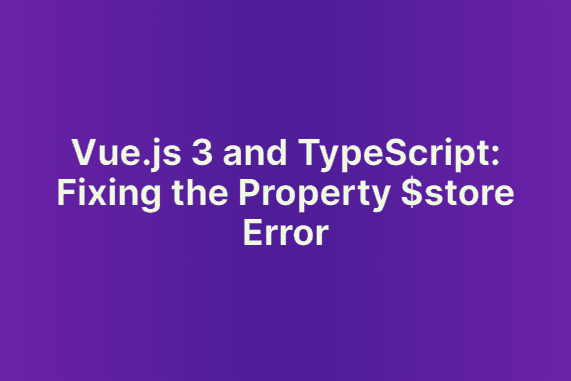Vue.js 3 and TypeScript: Fixing the Property $store Error

Introduction:
Vue.js 3 and TypeScript are powerful tools that allow developers to build robust and scalable web applications. However, when working with these technologies, you may encounter certain errors and challenges. One common error that developers face is the “Property ‘$store’ does not exist on type ‘ComponentPublicInstance’” error. In this blog post, we will explore this error in detail and provide a step-by-step solution to fix it.
Section 1: Understanding the Error
The “Property ‘$store’ does not exist on type ‘ComponentPublicInstance’” error occurs when trying to access the Vuex store in a Vue component using TypeScript. This error arises due to changes introduced in Vue.js 3. Prior to Vue.js 3, developers could access the Vuex store directly using the $store property on Vue instances. However, in Vue.js 3, the concept of Vue instances has been replaced with ComponentPublicInstance. This change in accessing properties on components leads to the aforementioned error.
Section 2: Identifying the Cause
To understand the cause of this error, it is crucial to grasp the changes introduced in Vue.js 3. In Vue.js 3, the ComponentPublicInstance is used instead of Vue instances. This new way of accessing properties on components requires a different approach when working with Vuex and TypeScript. By identifying this cause, we can proceed towards finding a solution.
Section 3: Solution - Importing and Typing $store
To fix the “Property ‘$store’ does not exist on type ‘ComponentPublicInstance’” error, follow these step-by-step instructions:
1.Import { useStore } from ‘vuex’: Begin by importing the useStore function from the vuex package. This function will allow you to access the Vuex store in your Vue components.
2.Declare a local variable ‘store’ using useStore(): Create a new local variable called ‘store’ and assign it the value returned by the useStore function. This will give you access to the Vuex store within your component.
3.Type ‘$store’ as ReturnType: Type the ‘$store’ property as ReturnType to ensure that TypeScript recognizes the correct type for this property. This step is crucial for TypeScript to properly infer the type of the Vuex store.
Section 4: Implementing the Solution
Now that we understand the solution, let’s implement it in our code. Update your code with the following import and type declaration:
import {
useStore
} from'vuex'
exportdefault {
// ...
setup() {
conststore=useStore()
// Use the store as needed
return {
store
}
}
}
By importing useStore from the vuex package and declaring the local variable ‘store’ using useStore(), you can seamlessly access the Vuex store in your Vue component. TypeScript will also recognize the correct type for the $store property by typing it as ReturnType.
Section 5: Testing and Verifying
After implementing the solution, it is important to test your application to ensure that the error no longer persists. Run your application and check if the “Property ‘$store’ does not exist on type ‘ComponentPublicInstance’” error is resolved. Additionally, carefully review your application for any other errors or discrepancies related to Vuex store usage.
Conclusion:
In this blog post, we discussed the common error message “Property ‘$store’ does not exist on type ‘ComponentPublicInstance’” that developers encounter when trying to access the Vuex store in a Vue component using TypeScript. We identified the cause of this error, which is the changes introduced in Vue.js 3. By correctly importing and typing the $store property, we can fix this error and seamlessly integrate Vuex with our Vue.js 3 and TypeScript project.
Remember to consider compatibility issues with other dependencies or versions of Vue.js when encountering similar errors. If you need further assistance, refer to official documentation, forums, or communities for additional guidance. By being aware of these solutions and best practices, you can overcome common errors and enhance your development experience with Vue.js 3 and TypeScript.
FREQUENTLY ASKED QUESTIONS
What does the error message Property $store does not exist on type 'ComponentPublicInstance' mean in Vue.js 3 and Typescript?
This error message typically occurs when trying to access the Vuex store directly from a Vue component, but the component's type definition does not include the '$store' property
How can I fix the error Property $store does not exist on type ComponentPublicInstance in Vue.js 3 and Typescript?
To fix this error, you need to define the correct type for your component. If you are using the Options API, you can define a custom type that extends the Vue component options and includes the '$store' property. If you are using the Composition API, you can use the 'defineComponent' function to define the component with the proper type definition.
Can you provide an example of how to fix the error Property $store'does not exist on type ComponentPublicInstance in Vue.js 3 and Typescript?
Sure! Here's an example of how you can fix this error using the Options API:
import { Vue } from'vue';
import { Store } from'vuex';
interface MyComponent extends Vue {
$store:Store<any>;
}
export default Vue.extend<MyComponent>({
// Component options...
});
And here’s an example using the Composition API:
import { defineComponent } from'vue';
import { useStore } from'vuex';
exportdefaultdefineComponent({
setup() {
const store=useStore();
// Component logic...
return {
// Component data, methods, etc.
store,
};
},
});
Are there any alternative solutions to fixing the error Property $store does not exist on type ComponentPublicInstance in Vue.js 3 and Typescript?
Yes, another alternative solution is to use the 'provide' and 'inject' functions to provide and inject the Vuex store into your components instead of directly
accessing it through the '$store' property. This way, you don't need to modify the type definitions for your components.
Example:
import { provide, inject } from'vue';
import { StoreSymbol, Store } from'vuex';
// In your main app file:
const store=createStore();
provide(StoreSymbol, store);
// In your component:
const store=inject<Store<any>>(StoreSymbol);
By providing and injecting the store, you can access it within your components without having to modify the type definitions explicitly.




